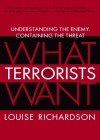What Terrorists Want: Understanding the Enemy, Containing the Threat
Written by: Louise Richardson,
New York, Random House, 2006,
ISBN: 9780812975444, 312pp.
Reviewed by: Dr Albert Palazzo, Senior Research Fellow, Land Warfare Studies Centre
Dr Louise Richardson is Executive Dean of the Radcliffe Institute for Advanced Study and a lecturer in government and law at Harvard. Born in Ireland of Catholic parents, Richardson grew up in a culture in which terrorism was part of the Republic’s background environment. She approaches her topic neither as a hawk nor as a pacifist, but as a rationalist with a deep—almost visceral—appreciation of terror.
In What Terrorists Want, Richardson combines a sweeping historical overview with policy prescriptions on how states can defeat terrorist organisations. Richardson’s tone is authoritative and covers terrorism in its entire context, commencing with the Roman-era Zealots of Palestine and working forward to the present US conflict with al-Qaeda. She retains her objectivity throughout. For example, readers may reject her characterisation of the African National Congress as a terrorist organisation, but, despite the noble nature of its cause, its members, in fact, employed terrorist tactics in their struggle against the Boer government of South Africa.
Richardson divides her book into two parts. The work’s first half focuses on the nature of terror and terrorists. In this section she defines terrorism, describes its causes, outlines how someone decides to embrace terrorism, and explains why they choose to become suicide bombers. In the face of the tactic of the suicide bomber she insists that terrorists are sane. Far from being irrational, terrorist organisations and their adherents are goal-driven and are no different to the members of other groups agitating for an ambitious degree of change. They have both short- and long-term objectives around which they shape their policies. In the near timeframe terrorists desire what Richardson calls the three ‘Rs’ - Revenge, Renown and Reaction. In the longer term, the supporters of terrorism seek major political change.
In the book’s second half Richardson turns to the evolution of US policy since 11 September 2001. Her criticism is comprehensive and her conclusions damning. Her most significant observations are that:
- by declaring a War on Terrorism the United States gave the terrorists the legitimacy they sought;
- by refusing to treat prisoners in accordance with the Geneva Convention the United States lost the moral high-ground;
- by refusing to work within international organisations, for example the United Nations and NATO, and to build a broad partnership with allies, the United States failed to access the considerable experience of other countries; and
- by treating the wars in Afghanistan and Iraq as conventional military operations, the United States alienated the indigenous populations and thereby provided terrorist organisations with an endless pool of potential new recruits.
Richardson’s opinion on the litany of US mistakes is that the Bush Administration did not want to learn from the mistakes of others: it wanted to learn from its own.
The most controversial assertion contained in What Terrorists Want is that a war against terrorism cannot be won. The reader will need to pause at this point in the book in order to not miss Richardson’s deeper message. She is not playing at semantics in arguing that the waging of a war against terrorism is an attempt to defeat a concept, or in the case of the current War on Terror, an emotion. Her argument is quite pragmatic here. By not declaring war on those specifically responsible for the attacks of 11 September, the United States set itself too high a criterion for victory. To succeed, the United States has to prevent any act of terrorism anywhere in the world while also eliminating every individual terrorist. This is not a manageable task, even for a superpower. Moreover, by employing the rhetoric of ‘war’, the United States has emphasised the military sphere in its response to 11 September 2001 and hence overlooked the possibility of political solutions. A more achievable objective for the United States would have been to contain rather than eliminate the threat and to nullify the terrorist’s message.
Although Richardson describes the tactics so far employed by the United States as misguided and counter-productive, her motivation is not to savage the Bush Presidency. She hints that the United States is now coming out of a necessary learning phase and that sounder ideas will hopefully be forthcoming. To advance the emergence of new policies Richardson proposes six strategic principles for the waging of counterterrorism. They are:
- have a defensible and achievable goal;
- live by your principles;
- know your enemy;
- separate the terrorists from their communities;
- engage others in countering terrorists with you; and
- have patience and keep your perspective.
None of these points are novel—they form the foundation of basic counterinsurgency doctrine—but they have been widely ignored by the United States. In failing to implement these principles at an early stage in its efforts against terrorism the Bush Administration has compounded the challenge it faces.
Richardson’s final objective in What Terrorists Want is to instil a degree of perspective and objectivity in policy makers and the public they represent. The recourse to terrorism is not new, nor is it a reaction to the emergence of the United States as the sole superpower. Instead, it is the traditional response of the powerless. Moreover, despite operational successes that achieve the short-term goals of ‘Revenge, Renown and Reaction’, the historical record shows that terrorist groups rarely succeed in the long-term. Judging by the past, the defeat of those practising terror is highly likely, if not inevitable. Despite the overall negative analysis of US policy so far, Richardson therefore remains an optimist.
This is a valuable book that is dispassionately written by an expert in the field. While it will serve her students well as a textbook, Richardson’s judgements and recommendations will also make important and compelling reading for policy makers. It is to be hoped that What Terrorists Want receives the attention it deserves.


